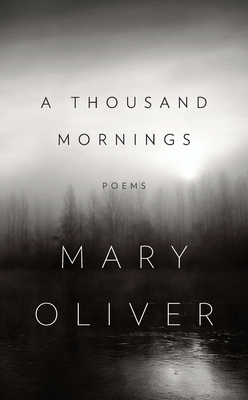Mornings with the Pulitzer Prize-winning poet Mary Oliver
In A Thousand Mornings, Mary Oliver returns to the imagery that has come to define her life’s work, transporting us to the marshland and coastline of her beloved home, Provincetown, Massachusetts. In these pages, Oliver shares the wonder of dawn, the grace of animals, and the transformative power of attention. Whether studying the leaves of a tree or mourning her adored dog, Percy, she is ever patient in her observations and open to the teachings contained in the smallest of moments.
Our most precious chronicler of physical landscape, Oliver opens our eyes to the nature within, to its wild and its quiet. With startling clarity, humor, and kindness, A Thousand Mornings explores the mysteries of our daily experience.
Edward says:
"A Thousand Mornings adds to Mary Oliver's reputation as one
of the two or three best poets writing today.
Whether the topic is the shore, the idea of nature as prayer and
devotion, or dancing, Mary Oliver's choice selection of words leaves the reader
reflecting on the simpler things of life, things that may go unnoticed if we
don't take the time to stop and pay attention.
'The Gardener' starts with deep philosophical
yearnings in these lines, 'Have I lived enough?/Have I loved
enough?' Juxtaposed which these
musings is the simplicity which the gardener, 'a simple man' tends to 'his children, the roses.'
Several poems are centered around dancing including 'If
I Were' and 'Three Things to Remember'.
The fox, the snake, and the mockingbird take center stage in
several other poems. 'The
Mockingbird', from a previous volume is one of my favorite poems ever, but
this one also is elegant in its beauty.
There is an homage to Bob Dylan and to her dog, and several
poems about spring. Mary Oliver
continues building upon the long honored tradition of music in verse to which
Keats wrote about so wonderfully in 'Ode to a Nightingale' with the
wonderful last lines, 'Was it a vision, or a waking dream?/Fled is that
music--Do I wake or sleep?' The
thrush is the impetus for her music from 'In Our Woods, Sometimes a Rare
Music' while in 'I Happened to be Standing' it is the wren.
There is a Blake-like innocence expressed in poems like 'Green, Green is My Sister's House' and 'Foolishness? No It's Not.' While experience dominates the powerful 'Hum, Hum' and the devastating 'Hurricane'. She also concerns herself with a
disappearing nature in 'The Morning Paper' and 'Extending the
Airport Runway.'
The first verse of the opening poem is 'I go down to
the shore in the morning' and the last verse of the final poem is
"\'Pray God I remember this.'
All of the poems and lines in between will make you want to get up a little earlier
in the morning to watch the sunrise over the seashore (or mountains), to look
out the window at the beautiful clouds and setting sun on your commute, and
hope that you, too, will find the words to bring more meaning and beauty to
your own life."


No comments:
Post a Comment